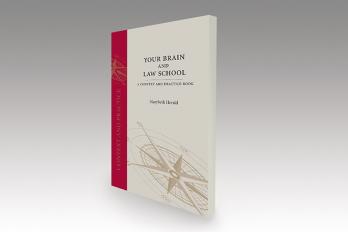Professor Herald Publishes Your Brain and Law School
September 8, 2014
Professor Marybeth Herald has been studying the science while observing the workings of the law student brain for almost 25 years. Now, Professor Herald has written an entertaining and practical guide titled Your Brain and Law School: A Context and Practice Book that offers law students a formula for success in school, on the bar exam, and as a practicing attorney.
Professor Herald’s theory is that mastering the law, either as a law student or in practice, becomes much easier if one has a working knowledge of the brain’s basic habits. Before you can learn to think like a lawyer, you have to have some idea about how the brain thinks. The first part of Professor Herald’s book translates the technical research, explaining learning strategies that work for the brain in law school specifically, and calling out other tactics that are useless (though often popular lures for the misinformed). This book is unique in explaining the latest science behind the advice and will save you from pursuing tempting shortcuts that will take you in the wrong direction.
The second part explores the brain’s decision-making processes and cognitive biases. These biases affect the ability to persuade, a necessary skill of the successful lawyer. The book talks about the art and science of framing, the seductive lure of the confirmation and egocentric biases, and the egocentricity of the availability bias. This book uses easily recognizable examples from both law and life to illustrate the potential of these biases to draw humans to mistaken judgments. Understanding these biases is critical to becoming a successful attorney and gaining proficiency in fashioning arguments that appeal to your audience – whether law professors, bar examiners, and employers, or clients, jurors, and judges.
First inspired to write the book at a conference on “Humanizing Legal Education,” Professor Herald is grateful to her many colleagues, students, and dedicated research assistants that inspired her to craft the guide and offered useful feedback. You can download the introduction, “Why You Should Read This Book”, for free.
